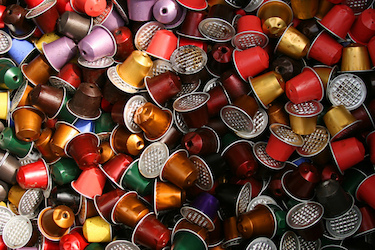Banning Coffee Pods in Ontario a Reasonable Waste Solution?
 As Ontario looks to different methods in reducing its growing waste problem, some have come forward requesting a province-wide ban on coffee pods. To some, this might seem a little strange but to those who have tuned into the ongoing waste debates in Ontario the last few years knows that there’s at least some validity to the argument.
As Ontario looks to different methods in reducing its growing waste problem, some have come forward requesting a province-wide ban on coffee pods. To some, this might seem a little strange but to those who have tuned into the ongoing waste debates in Ontario the last few years knows that there’s at least some validity to the argument.
Ontario Progressive Conservative MPP Norm Miller is arguing for a law to require any single-use coffee pods sold in the province to be capable of being composted within four years after production. He argues that if this can be achieved, that would mean a big chunk out of the more than 1.5 billion coffee pods that end up in Canadian dumps every year.
Currently, the majority of coffee pods sold in Ontario cannot be recycled and are not compostable. That means they inevitably end up in landfills. They may appear small in consumer hands but imagine the impact that millions upon millions of these make every year.
The banning of coffee pods that are non-recyclable or non-compostable is not an unreasonable request, according to most. Numerous companies have already jumped on board in selling compostable coffee pods, including Loblaw’s, McDonald’s, and the Muskoka Roastery Coffee Company. These companies are already leading the way, demonstrating how a compostable coffee pod law would be more than workable in this day and age.
The brands mentioned use Keurig-style compostables however a recent invention from the Toronto-based Club Coffee brand also serves as a model for a compostable pod. The Club Coffee model uses plant materials and skins from reclaimed coffee beans. The major benefit to using this model is that they biodegrade within five weeks.
In terms of how such a waste solution law would impact the consumer, it likely would no zero effect. No consumer will be required to change their behaviour. Simply put, the single-serve coffee pod model would be modified in a way that has a hugely positive impact on post-consumption. The Club Coffee model has not yet been approved for province-wide consumption however they have already undergone successful compost testing in Muskoka, Orillia, Peel, Guelph, and Niagara.
There are some who may argue this to be an example of unfair business regulation and market tempering however to that argument, it could be said that the biggest names in coffee pod manufacturing are already behind a new way.
To critics who agree with the production of compostable coffee pods and who disagree with a mandatory law on the subject need only be pointed to the current state of affairs. Many Ontario municipalities currently do not accept compostable coffee pods in their compost systems due to two reasons – it can be difficult to tell which pods are compostable and which are not; and consumers end up confused in attempting to compost pods that are non-compostable.
There is no jurisdiction in North America that has banned non-compostable coffee pods. As seen here however, the model has already been proven as implementable and adjustable, and the benefits to the province’s landfills are significant. The province of Ontario has the opportunity to lead on the manufacturing and consumption of compostable coffee pods. It’s our hope that they will.


